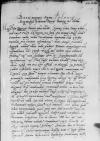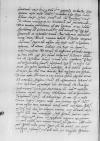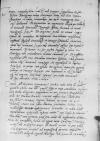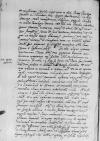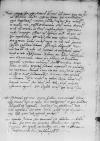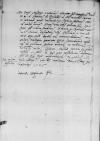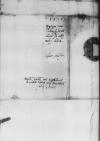1525-09-07⌊
Septima huius1525-09-07⌋ Tuas ultimas sub
data
⌊Toleti ad
Fagum(!)⌋
1525-06-15⌊XV Iunii1525-06-15⌋ per manus magnifici ⌊Ludovici⌋ secretarii nostri nobis transmissas accepimus ⌊⌋, quibus tantum pro hac vice respondemus. Nam mense praecedente Augusto omnibus antea inde habitis etiam duplicatis nostris respondimus litteris, quarum utrasque vel saltem earum alteras credimus nos iam habuisse Strenuitatem Tuam. In quibus quidem litteris significavimus nos illud fuisse summum studium, illud desiderium nostrum et Tuae Strenuitatis officium et obsequium, quod potuissemus habere resolutionem super illo V vel sexto matrimonii nostri capitulo, quo cavetur bonorum alienatio, cum illa tamen satis periculosa modificatione, qua legatarii adversus nos agere contendunt, volentes nos per indirectum privare successione bonorum nostrorum ob graves et quasi intolerabiles pecuniarum summas in bonis illis obligatas, et ex aliis evidentissimis causis in illis nostris duplicatis litteris descriptis, requirebamus eiusdem interpretationem sacrae ⌊caesareae maiestatis⌋. Quia tamen (uti nobis his suis ultimis perscripsit litteris) supplicationem et decretationem desuper huiusmodi in se continentem non potuit habere talem interpretationem, quali opus erat, sed conceditur iuris et legis auctoritati iudicialiter cognoscendum auditis quorum interforet etc., patientiam habebimus, licet non libenter. Et licet nos non usque quaque fidimus iudicibus Neapolitanis, quorum nonnullos ob illorum interesse suspectos habemus, attamen loco et tempore opportunis habitis iuris peritorum consiliis iuris et legis officio experiemur attenta confirmatione capitulorum matrimonii nostri huiusmodi satis bene per Tuam Strenuitatem expediti et bullati, cuius copiam misit nobis ⌊Ludovicus⌋ una cum aliis copiis litterarum ⌊caesareae maiestatis⌋, iustitiae huiusmodi nostrae ad exsecutores testamenti ac etiam viceregem seu locum tenentem suum promotoriarum etc. Et si tandem gravabimur ab ipsis legatariis et eorum iudicibus, appellabimus ad ⌊caesaream maiestatem⌋, sed antequam nos super his conveniamur et respondere teneamur, prius integram possessionem totius ⌊status Barensis⌋ una cum ⌊castello⌋ et civitate recuperare deberemus. Quam tunc adhuc non fuisse nobis relaxatam testantur litterae ultimae ⌊Ludovici⌋ sub
data
IIII Augusti nobis transmissae. Et mirari non sufficimus, quo errore contigit, quod Tua Strenuitas, quae hoc primum diligentissime sollicitare debuit, ut illi castellano Barensi ternas etiam quaternas caesareas ad relaxandum huiusmodi possessionem ⌊castelli⌋ expediret litteras, sciens hoc ipsum castellanum postulasse et in commissis habuisse. Attamen hoc Strenuitas Tua tam diu facere neglexit seu distulit et licet nobis Strenuitas Tua in una parva cedula istis suis ultimis litteris introclusa scripserit tales alias observatorias caesareas ad illum castellanum expedivisse litteras, et una cum illo privilegio confirmationis capitulorum matrimonii nostri ⌊Ludovico⌋ misi{si}sse, quarum vigore nos vocari debebamur ad relaxandam possessionem castelli ab adversariis, et non illi a nobis, tamen Ludovicus scripsit nobis non habuisse eiusmodi litteras et ita adhuc tunc possessionem castelli nactum non fuisse. Credimus nos Strenuitatem Tuam aut per aliquem errorem, aut oblivionem (ut fit) eiusmodi litteras non interclusisse. Iterum hortamur, habeat super istis diligentissimam curam, ut possessionem integram assequamur, sic enim videmur eam retinere tamquam per caudam, quando adhuc ipsum castellum nostrum, quod caput est, non habemus. Nec satis intelligere possumus, quid sibi velit haec tragoedia contraria.
Insuper, ut nobis idem ⌊Ludovicus⌋ nunc scripsit, impedimur in possessione privilegiorum nostrorum antiquorum ⌊matri⌋ nostrae, dum vixit, concessorum, et nobis innovatorum per dominum viceregem seu eius locum tenentem et signanter in cognitione causarum secundarum et tertiarum criminalium, expresse contra formam et tenorem privilegiorum huiusmodi, et maxime primi et ultimi. Quorum copias ibi revideat et reperiet luce clarius iurisdictionem eiusmodi causarum secundarum et tertiarum criminalium pleno iure apud nos remanere. In qua nunc stantibus adhuc istis impedimentis inquietamur et tamen ne hoc postea trahatur in usum et privilegiis nostris praeiudicaret, mature obviandum est. Et propterea expediat Sinceritas Tua mandata severiora caesarea, etiam poenalia contra illos loca tenentes viceregis, ne impediamur in nostris privilegiis et ipsorum toto effectu. Et signanter super ista cognitione secundarum et tertiarum causarum, sed conservemur in illis firmissime usque ad unguem sub poenis caesareis ipso facto incurrendis et hoc mandatum mittat ⌊Ludovico⌋.
Ceterum, quod non parvi reputamus, scribit nobis idem noster ⌊Ludovicus⌋ isdem ultimis suis litteris, qualiter
illustris
dominus ⌊dux Mediolani⌋ requirat cum summa diligentia quandam (ut ait) priorem investituram suam de ⌊ducatu Barensi⌋ vivente adhuc tunc patre suo per felicis memoriae regem Federicum de anno 1497, priusquam ⌊mater nostra⌋ hunc statum habuisset, factam. Qua mediante ipse ⌊dux⌋ se nobis nobis opponere contendit et nobis aliquod impedimentum et fastidium inferre nititur. Quae causa si movebitur, Tua Sinceritas non ignorat, quid pro nobis ibi respondere debeat. Nam si processum fuerit de rigore iuris, credimus privilegia ⌊matris nostrae⌋ subsistere satis, et maxime primum, in quo omnia illa sequentia funda<n>tur ad propulsandum hoccine impedimentum. Et Tua Sinceritas diligenter inspecto privilegio non careat ibi et amicorum et iuris peritorum consilio, satis enim in dicto primo privilegio cautum et obviatum fuit hisce cavillationibus et impedimentis, modo recenseantur diligenter singulae clausulae in eodem privilegio contentae. Et ⌊mater⌋ nostra pacifice possidebat hunc statum a XXVIII annis et ultra, et nos nunc, quae successores sumus et iure materno possidemus, sic indigne et iniuste impeti debeamus? Habemus pro nobis et optimas rationes et clarissima iura ac evidentem iustitiam, modo hoc proponat et diligentissime recenseat Sinceritas Tua coram sacra ⌊caesarea maiestate⌋.
Si autem aliqua aequitate impeteremur, tunc Sinceritas Tua exponat similem aut maiorem aequitatem nos habere ad ⌊Mediolanum⌋ et ⌊Cremonam⌋ et omnia et singula bona illa et Ponte Tremuli, prout hoc iam dudum Sinceritas Tua habuit in commissis cum doctore ⌊Borgk⌋ dicendum et nunc iterum reducat in memoriam sacrae ⌊caesareae maiestati⌋. Et ita si aequitate agatur, unam aequitatem cum alia pari petat compensari. Si autem rigore iuris conveniemur, restituta utique nobis tamquam spoliatis totali possessione reconveniat eum nostro nomine pro ⌊Mediolano⌋ et ⌊Cremona⌋. Et procedatur pari passu secundum illam priorem informationem nostram. Nec se omnino a curia illa caesarea moveat, nisi prius a ⌊regia maiestate⌋ et a nobis expresse revocata fuerit. Videt enim, quid hoc nobis adhuc ibi incumbat praesente Tua Sinceritate, quid facerent ea absente? Nos, uti antea scripsimus, ita eandem ibi honesto salario provideri fecimus ducatis LXXX-ta singulis mensibus. Quam ordinationem et modum eiusmodi pecuniae capiendae et a quo, descripsit iam de nostris voluntate et mandato ⌊Ludovicus⌋ noster. Et plura alia, ad quae nos referimus, quae omnia processerunt de mente nostra et certa scientia. Nolumus enim, ut a ⌊Focaris⌋ Focaris aliquid plus capiat, posteaquam illos CCC-tos eis restituimus et cedulam rehabuimus. Nunc etiam cum istis mittuntur Sinceritati Tuae litterae sacrae ⌊regiae maiestatis⌋ ad ⌊caesaream maiestatem⌋, quarum copias hic introcludimus, quas duplicatas una cum praesentibus nostris fieri voluimus et duplici via propter securitatem illas mittere decrevimus et ita non miretur, si binas eiusdem sensus reperiet. Quibus acceptis offerat eas ⌊caesareae maiestati⌋, et quoad hoc impedimentum, quod nobis ille ⌊dux ⌋inferre molitur, non ignorat, quibus verbis regio et nostro nomine haccine causam explicare debeat. Hoc autem diligentissime curet, ut Tua Sinceritate ibi praesente ab impetitione et molestatione ipsius ⌊ducis⌋ in toto absolvamur et finem per ⌊caesaris⌋ declarationem aut determinationem etiam per planam et summariam cognitionem reportare valeamus, aut iure et iustitia compescatur et eidem perpetuum silentium imponatur, et quoadusque ita impetemur, numquam enim ita tutae aut securae essemus ab istis domini ducis iactationibus et semper cum periculo et damno et ne rursus in eadem causa nuntios nostros fatigare teneamur, aut Tuam Sinceritatem ibidem quasi perpetuo asservare cogamur, sit aliquando certus his turbis finis.
De contentione Sinceritatis Tuae, quam habuit cum secretario caesareo super titulis regis et nostris bene intelleximus et haec pessum dari, sed quod illi respondit, laudamus et probamus. Recte bene respondit, sic enim licuit, quod vulgo dici solet, quo casu quaeris eodem respond<er>i patiaris.
De conubio Pruteno nec somniatum est. Fabulam et commentum credat, hoc enim nec honestati convenit, nec rationi congruit, nec umquam sperandum erit ita et sentiat, et praedicet Sinceritas Tua confidentissime.
De ⌊ducis Moscorum⌋ oratoribus placuit, quod scripsit Sinceritas Tua et quod dominus ⌊Antonius de Comitibus⌋ cum illis remittitur, animo et intentione pacis tractandae etc. parum fidimus. Nec id multum curatur, minus Tua Sinceritas sollicita sit, hoc curet, quod eidem scribimus. Et tamen prout commendavit nobis dominum ⌊Antonium⌋, suscipimus illum commendatum a Tua Sinceritate et sacrae ⌊regiae maiestati⌋, domino nostro, recommendabimus, ut saltem intelligat hanccine Sinceritatis Tuae commendationem apud nos non parvam habere auctoritatem et valorem. Verum tamen melius ⌊caesarea maiestas⌋ faceret, si nobis iustitiam et pacem in his, quae postulamus, ministraret, quam se super his intromitteret, in quibus illi nil interest et nos non postulamus. Et bene valeat.
